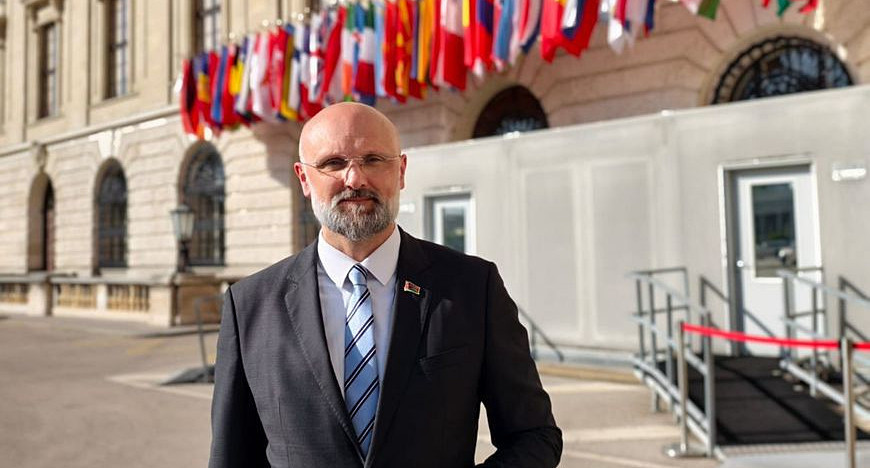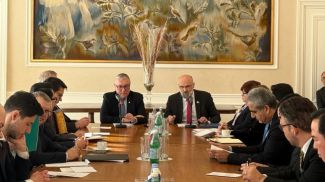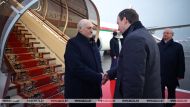
Belarus believes that the Organization for Security and Co-operation in Europe (OSCE) requires a profound reassessment of its purpose, Belarusian Deputy Minister of Foreign Affairs Igor Sekreta said in an interview with BelTA ahead of the 50th anniversary of the Helsinki Final Act, that was signed on 1 August 1975. The half-century anniversary has prompted deep reflection on the organization's role in contemporary geopolitics, the imperative for reforms to restore its depoliticized operational nature, and Belarus' contributions to maintaining pan-European security.
Mr Sekreta, on 31 August you will participate in the high-level OSCE conference in Helsinki, hosted under Finland's chairmanship to commemorate this anniversary. In your view, what is the significance of this historic event through the lens of the OSCE's contemporary work? How would you characterize Belarus' contributions to strengthening European security processes?
The conference commemorating the 50th anniversary of the Helsinki Final Act, which established the foundation for the OSCE and concluded Cold War-era European security negotiations at the height of ideological confrontation during the Iron Curtain period, provides an important opportunity to reflect on our organization's achievements, particularly in light of contemporary challenges and threats.
The principle of indivisible security, enshrined in this 1975 document, was never merely declarative. It represented a deliberate commitment to dialogue, compromise, and mutual respect. Belarus has consistently upheld this principle as fundamental to strengthening peace across the European continent.
Since joining the OSCE in 1992, Belarus has actively worked to enhance the organization's authority and establish conditions for its transformation into a genuine pillar of European security. At the 1994 Budapest Summit, Belarus was among the key initiators of developing a new European security model—one that accounted for the continent’s evolving military-political landscape and anticipated 21st-century challenges.
At the 1999 OSCE Summit in Istanbul, the Charter for European Security was signed. It was designed to establish a framework for further cooperation among participating states, coordinated efforts between international organizations and unified approaches to security across the OSCE region. The Agreement on Adaptation of the Treaty on Conventional Armed Forces in Europe (CFE), signed at the same summit, marked a pivotal shift - from Cold War bloc-to-bloc arms control to cooperative security frameworks in Europe, while enabling accession for new states.
Can we say the Spirit of Helsinki still lives today? If not, what in your view are the reasons behind this negative transformation?
Regrettably, recent decades have seen a steady departure from the Helsinki principles. The prevailing confrontational mindset, the policy of sanction pressure, the degradation of arms control mechanisms and confidence-building measures, increasing militarization, and mutual accusations have collectively led to a profound systemic crisis within the OSCE.
NATO has consistently sought to position itself as Europe's sole military-political security guarantor over recent decades - a stance that directly contradicts the principles of continental stability and peace enshrined in the Helsinki Final Act and other fundamental OSCE documents, including the Charter for European Security.
In critical security matters, the OSCE has been increasingly sidelined, focusing primarily on humanitarian issues while duplicating the work of other European institutions. The organization's peacekeeping efforts over the past decade have yielded no tangible results. On the contrary, the OSCE has failed in all its peacemaking attempts across the post-Soviet space.
More concerning still, OSCE structures have grown increasingly interventionist in the internal affairs of sovereign states. We observe a continued erosion of the organization's intergovernmental nature. At the expense of constructive cooperation between member states, OSCE events now frequently platform marginal - sometimes entirely phantom - NGOs and so-called civil society representatives holding extremist views.
The organization increasingly becomes an arena for political clashes, with its structures turning into tools of pressure rather than cooperation.
What solutions does Belarusian diplomacy propose to address the erosion of Helsinki principles and help OSCE overcome its systemic crisis?
The OSCE remains the sole platform uniting North America, Europe, and the post-Soviet space. This very inclusiveness must be preserved and leveraged to reboot meaningful dialogue. Belarus believes the time has come for a fundamental reassessment of the OSCE's mission. The organization requires reforms to restore its consensus-based, depoliticized, and inclusive nature.
A crucial decision awaits: whether participants want the OSCE to become an effective institution with clear structures, or remain as malleable clay shaped by the transient interests of certain powerful states.
Guided by this vision, Belarus has consistently advocated for launching a new comprehensive international security dialogue – a Helsinki 2 process. We firmly believe that breaking the current deadlock requires broad discussions involving expert communities, academic institutions, youth organizations, and civil society alongside governments. Only through such inclusive engagement can we restore the organization's original purpose and effectiveness.
Could you elaborate on Belarus’ recent efforts to counter the outlined negative trends and to revive the “Helsinki spirit” on our continent?
At the II Minsk International Conference on Eurasian Security in autumn 2024, we proposed for international discussion the Eurasian Charter of Diversity and Multipolarity in the 21st Century. This document aims to affirm respect for each country’s cultural, political, and economic choices, emphasizing the inadmissibility of sanctions pressure, ideological segregation, and forced imposition of development models.
This Charter is not intended to replace existing structures, but rather to provide a conceptual bridge between different worldviews. It aims to serve as a foundation to build a Eurasian security architecture and shape a fair multipolar world order. The Charter could become a subject of dialogue within the OSCE, especially if we aim to revive the “Helsinki spirit” in Europe. Progress made in this direction will be addressed in one of the sessions of the upcoming III Minsk International Conference on Eurasian Security this autumn.
Belarus remains an open and constructive partner. We continue to participate in OSCE activities, are ready to host international events, and actively promote cultural diplomacy, humanitarian cooperation, exchanges, and education. In times of geopolitical turbulence, it is especially important not to lose our guidelines. The Helsinki Final Act was adopted after the most devastating war of the 20th century. It reminded us that peace can only be achieved through mutual respect and security, which must be indivisible.
We call on all participants to return to these principles, not as relics of the past, but as the foundation for a common future. This call is reinforced by the symbolism of the current year: the 80th anniversary of the Great Victory of the Soviet people and the Allies over fascism, and the 50th anniversary of the Helsinki Final Act.
Alina Grishkevich,
BelTA.













